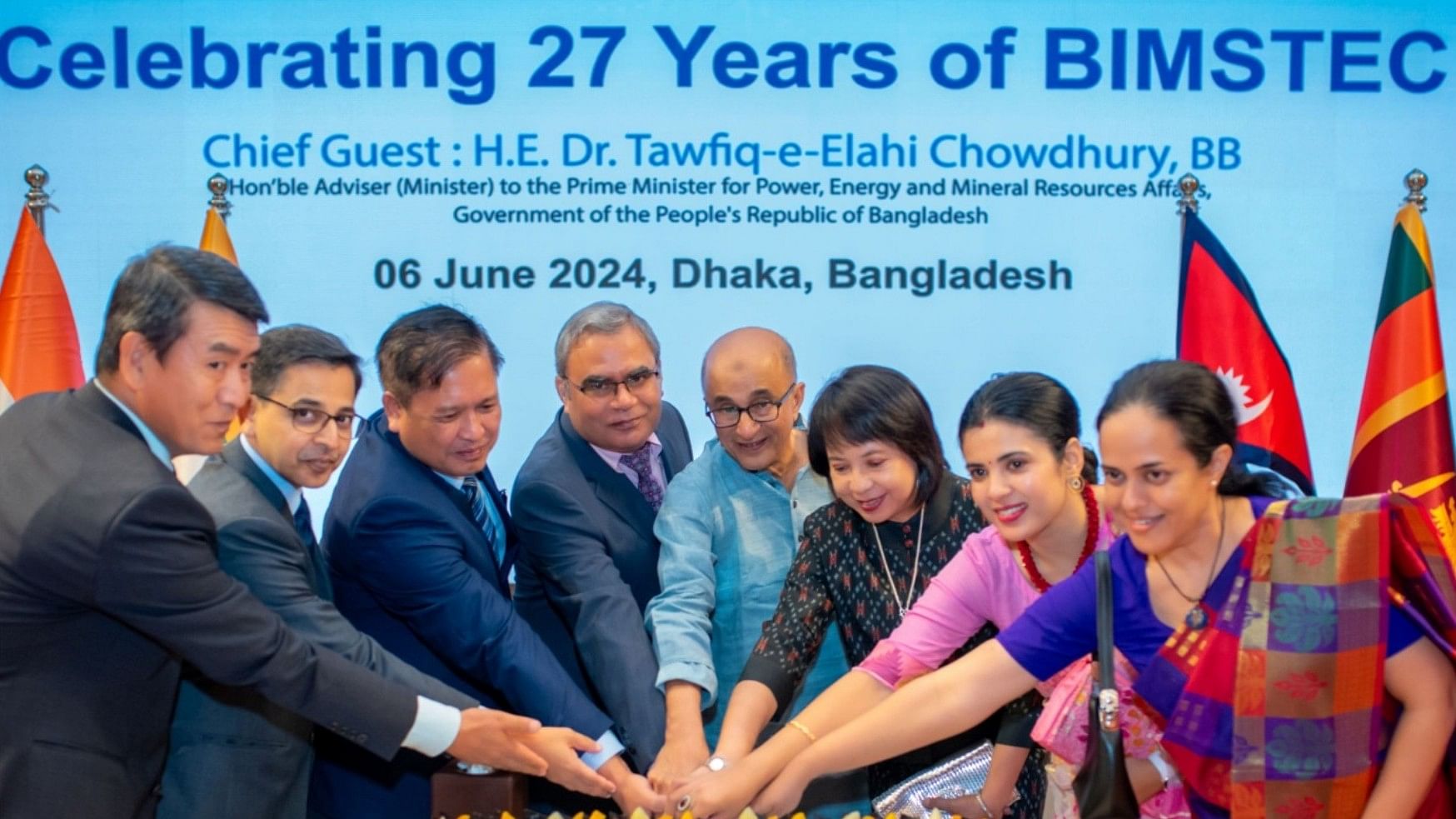
The BIMSTEC Secretariat hosted a reception on 6 June 2024 to celebrate the foundation of BIMSTEC with the signing of the Bangkok Declaration, on 6 June 1997.
Credit: X/@BimstecInDhaka
The Bay of Bengal Initiative for Multi-Sectoral Technical and Economic Cooperation (BIMSTEC), despite its establishment in 1997, officially saw its charter come into force on May 20, 2024. Although the need for the BIMSTEC charter had been felt for a long time, the decision to commence the drafting process was made during the 4th summit in 2018. It was finally signed by the member states during the 5th summit held in March 2022, and it came into being when Nepal ratified it in April this year.
Until the charter came into being, the grouping had been guided by documents like the Bangkok Declaration of 1997, the Memorandum of Association of 2014 and the Headquarters Agreement of 2015. The charter lays out for the Bay of Bengal grouping "a long-term vision and priorities for cooperation, clearly delineating roles and responsibilities of different layers of institutional structure and decision-making process". With 11 chapters and 36 articles, the charter has now given BIMSTEC the "legal and institutional framework".
Interestingly, the principles of BIMSTEC are based on the Panchsheel (Five Principles of Peaceful Co-existence); and cooperation within BIMSTEC is identified as "complementary to and not a substitute for bilateral, sub-regional, regional or multilateral cooperation among the member states". This is significant to note because India's special attention and interest in advancing BIMSTEC activities is mistaken as a move to avoid Pakistan’s involvement. In reality, India never saw BIMSTEC as an alternative to SAARC. Instead, it views the Bay of Bengal grouping as "the synthesis of our Neighbourhood First and Act East policies".
One of the important provisions mentioned in the charter is the expansion of BIMSTEC. At the time of its establishment in June 1997, the grouping was termed 'BIST-EC' to represent economic cooperation among the four founding members: Bangladesh, India, Sri Lanka and Thailand. Later that year, with the inclusion of Myanmar, 'BIST-EC' became 'BIMSTEC'. Nepal and Bhutan, though landlocked, were allowed to become members in 2004 with the justification that they rely on the Bay of Bengal for their external trade. BIMSTEC is the only regional grouping that acts as a bridge between South Asia and Southeast Asia by virtue of having five member countries from South Asia and two from Southeast Asia. That is where the expansion of BIMSTEC beyond the Bay of Bengal, as provided in the charter, gains significance.
As per Article 6(2)(a) of the charter, "The applicant State shall satisfy the conditions of territorial contiguity to, and/or direct opening into, or primary dependence on the Bay of Bengal for trade and transport purposes and/or any other criteria agreed upon in the BIMSTEC Ministerial Meeting." Going by this criteria, Pakistan's membership looks difficult. The only hope for Pakistan is the mention of "any other criteria agreed upon in the BIMSTEC Ministerial Meeting". Interestingly, China meets all criteria for full membership, except that some members may raise objections on the grounds that any new member's inclusion should not hinder the "unity and solidarity of BIMSTEC". Also, if China is admitted as a full member, it might push Pakistan’s entry. In that case, BIMSTEC would face divided opinions on the new membership issue and perhaps mutate into SAARC 2.0.
Therefore, what is prudent at this juncture is to incorporate members and observers who pose no risk of polarising the organisation. In the expansion plan, BIMSTEC may consider having observers who could contribute to the activities and programmes of the grouping. There is a provision for the inclusion of observers under Article 7(1)(d) of the charter. What is puzzling, however, is that while for the admission of observers, the principle of "unanimity" is mentioned, for the admission of new members, it is just stated as based on “approval of BIMSTEC Summit, upon the recommendation of the BIMSTEC Ministerial Meeting". At the same time, Article 18 of the charter states that "all decisions in BIMSTEC shall be based on consensus". One is not sure whether it is a simple oversight or by design.
Unlike 'members', 'observes' could be international/regional organisations as well. A plethora of pertinent international and regional organisations could be invited as observers. Apart from notable groupings like SCO, ASEAN, EU, UN, BRICS, BESA, African Union, IORA and APEC, SAARC could also be invited as an observer. There is, of course, a peril of Pakistan raising some unwanted issues in the deliberations. This, however, could be managed with conditionalities for the involvement of observers in discussions on sensitive issues.
Considering BIMSTEC's sectoral model of operation, the incorporation of associate members may be considered to specifically cooperate on already identified sectors like trade and investment, technology, energy, transportation and communication, tourism, fisheries, agriculture, cultural cooperation, environment and disaster management, public health, people-to-people contact, poverty alleviation, counter-terrorism and transnational crime, and climate change. Such expansion is non-controversial, focused and fruitful. BIMSTEC going beyond the Bay is a good move, but it needs to proceed with calibration.
(The writer is Director, Centre for East Asian Studies, Christ deemed to be University, Bengaluru)